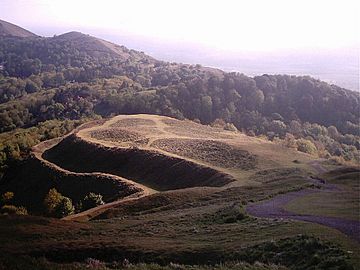Herefordshire Beacon facts for kids
Quick facts for kids Herefordshire Beacon |
|
|---|---|

Herefordshire Beacon
|
|
| Highest point | |
| Elevation | 338 m (1,109 ft) |
| Geography | |
| Location | Malvern Hills, England |
| Topo map | OS Landranger 150 |
| Geology | |
| Age of rock | Pre-Cambrian |
| Mountain type | Igneous, Metamorphic |
| Climbing | |
| Easiest route | Hiking |
The Herefordshire Beacon is one of the highest peaks in the Malvern Hills in England. It's so tall that it's actually called a mountain! This special place is famous for an ancient British Iron Age hill fort, which is like a huge old fortress made of earth. This fort is known as British Camp.
Inside the fort, there was once a type of castle called a ringwork and bailey. People also found signs of about 120 huts, showing that many people lived there long ago. British Camp has been a protected historical site since 1923.
About Herefordshire Beacon
Herefordshire Beacon is part of the beautiful Malvern Hills. It stands about 338 meters (or 1,109 feet) high. This makes it the second tallest peak in the entire Malvern Hills range. The rocks that make up the mountain are very old, formed before the time of dinosaurs!
Exploring British Camp
At the very top of Herefordshire Beacon, you'll find the amazing Iron Age hill fort called British Camp. This fort was a busy settlement where people lived between the 4th century BCE and the 1st century CE. Imagine living in a fort on top of a mountain!
Inside the fort, a special kind of castle, known as a ringwork and bailey, was built later on. Experts have found clues that around 120 huts were once inside the fort's walls. This shows that many families lived and worked there. Because it's such an important historical site, British Camp was officially made a scheduled monument on August 10, 1923. This means it's protected so everyone can learn about its past.
The British Camp Reservoir
Close to British Camp, on the eastern side of Herefordshire Beacon, there's a large reservoir called British Camp Reservoir. A reservoir is like a big lake that stores water. This one can hold about 213,000 cubic meters of water!
Even though it's big, this reservoir hasn't been used for many years. In 2017, a company called Severn Trent suggested taking apart the water treatment plant linked to it. They also planned to drain most of the water, leaving a smaller pond of about 8,000 cubic meters.
 | William Lucy |
 | Charles Hayes |
 | Cleveland Robinson |

